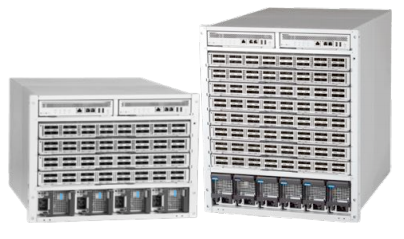
Quick Look Datasheet
Arista 7320X Series Network Switch

7320X Series Network Switch
High Performance
- 50Tbps system capacity
- Up to 38 billion packets per second
- Wire speed unicast & multicast
- Class leading latency
- High density 40G/100G
- 16MB buffer per port group
- Under 17W per 100G port
Feature Rich
- High Availability
- DC optimized airflow
- Rich L2 and L3 features
- 64-Way MLAG
- 128-Way ECMP
- VXLAN gateway
- Zero Touch Provisioning
- Hitless MLAG ISSU
High Scalability
- Wirespeed L2 and L3 forwarding
- 256 x 100G and 40G
- Quad 10G and 25G - 1024 ports
- Scalable Spine and Spline designs
- UFT: MAC 136K / IPv4 Hosts 104K
- ALPM: Max Routes: 128K IPv4 / 84K IPv6
Advanced Monitoring
- CloudVision
- LANZ microburst detection
- AEM proactive management
- sFlow for network visibility
- SSD for local monitoring
- VM Tracer integration
- RAIL for Big Data and Hadoop
Arista 7320X Series Introduction
The Arista 7320X Series are the benchmark for performance, scale and power efficiency in modular data center switches. Adoption of 25G servers is accelerating the need for flexible, dense 100GbE/40GbE solutions with support for both 10GbE and 25GbE speeds. The Arista 7320X Series extends the industry leading 7300 Series with increased performance, scalability, density and features designed for software driven cloud networking.The Arista 7320X Series are a range of modular systems, a 4-slot and 8-slot, with a choice of native 100GbE and 40GbE interfaces for high performance, low latency and scalable multilayer switching powered by Arista EOS, the worlds most advanced network operating system.
7320X Deployment Scenarios
Scale out network designs allow solutions to start small and expand over time; simple highly scalable one and two-tier network designs are built with MLAG, ECMP and VXLAN technologies.Cloud Networking: 2-tier Leaf/Spine or 1-tier Collapsed Spine

The 7320X Series are ideal for a number of deployment scenarios inside the data center. With a choice of systems each capable of high density 100G and 40G they are ideal for use as a single tier collapsed leaf and spine or at the spine layers of two-tier networks. The Arista universal network architecture is optimized for all application types ranging from large cloud to enterprise deployments. The following are a selection of use cases:
-
Collapsed Spline™ Server
— access as middle of row or end of row supporting full range of 10G, 25G and 40G connection options -
Leaf-Spine
— open standards based L2 and L3 with monitoring and visibility features — LANZ, DANZ, Tracers -
ECMP Designs up to 128-way
— cost-effective 100GbE multi-pathing using open protocols -
Software Defined Networking
— with support for VXLAN, OpenFlow, DirectFlow, and eAPI -
Cloud Scale Modular Switch
— with high availability features and choice of 40G and 100G density up to 256 x 40G or 100G and full L2 and L3 features -
Grid / HPC
— designs requiring cost effective and power efficient systems to enable non-blocking or minimal over-subscription -
Spine for Hadoop and Big Data Applications
— with east-west connectivity -
Directly Connected 25GbE, 40GbE and 50GbE Attached Storage
— dense NFS systems, requiring high performance and predictable latency
Arista EOS
Arista EOS is a modular switch operating system with a unique state sharing architecture that cleanly separates switch state from protocol processing and application logic. Built on top of a standard Linux kernel, all EOS processes run in their own protected memory space and exchange state through an in-memory database. This multi-process state sharing architecture provides the foundation for in-service-software updates and self-healing resiliency.7320X Series Systems
Arista 7320 Series support redundant hot-swappable power supplies, fabric and fan redundancy, EOS high availability, a choice of L2 and L3 multi-pathing designs and powerful EOS innovations for visibility, application level performance monitoring and virtualization.| Feature | Description |
|---|---|
CloudVision |
Network-wide workflow automation and workload orchestration as a turnkey solution for Cloud Networking |
Wirespeed VXLAN Gateway |
Seamless integration between VXLAN and L2/L3 environments, physical and virtualized networks |
Smart System Upgrade |
Optimized SW upgrades to reduce the impact of software upgrades and avoid network convergence |
128-way ECMP and 64-way MLAG |
Improve network scalability and balance traffic across large-scale leaf-spine designs or server load balancers |
Latency Analyzer |
A solution to improve monitoring and visibility at both 100G and 40G for congestion from persistent or microbursts. |
Cloud Control |
Support for Openflow and OpenStack automation and self-service provisioning with cloud scale economics |
Scalable Tables — ALPM and UFT |
Flexible allocation of L2 and L3 forwarding table resources for greater design choice |
| Component | 7328X | 7324X |
|---|---|---|
Linecards |
8 | 4 |
100G Ports |
256 | 128 |
40G Ports |
256 | 128 |
10G Ports |
1024 | 512 |
25G Ports |
1024 | 512 |
50G Ports |
512 | 256 |
System Capacity |
50Tbps / 38Bpps | 25Tbps / 19Bpps |
Total Buffer |
256MB | 128MB |
Latency |
2 µs | 2 µs |
Size |
13RU | 8RU |

Arista Networks Linecards
Copyright © 2017 Arista Networks, Inc. All rights reserved. CloudVision, and EOS are registered trademarks and Arista Networks is a trademark of Arista Networks, Inc. All other company names are trademarks of their respective holders. Information in this document is subject to change without notice. Certain features may not yet be available. Arista Networks, Inc. assumes no responsibility for any errors that may appear in this document. 11-0013-02
